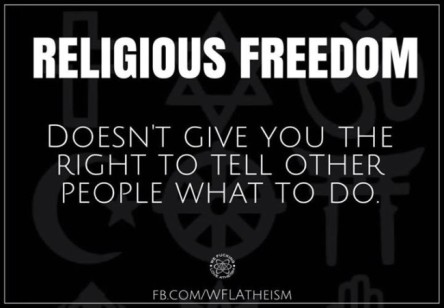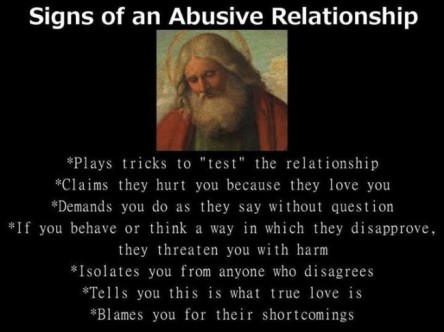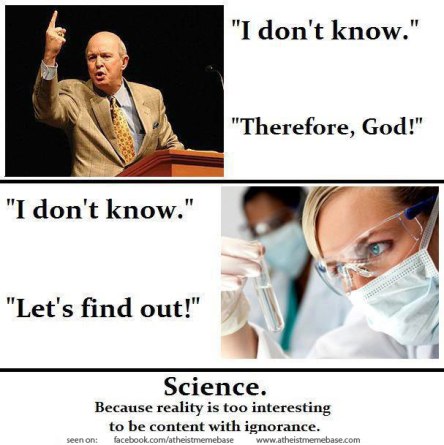As with all such documents, a revision history is included at the bottom.
Trigger Warning: What started as an essay has ended as an angry rant. It is not, as I discuss below, anger at God, but rather is anger at the impact that religion is having on the world. This anger is a real part of me, so I think it would be disingenuous for me to not post the essay. If you really want to understand me as an atheist, which is an important step in trying to convert me, then you need to understand why atheism matters to me so much. I have explained some of the intellectual aspects in other essays, but the emotional aspects are just as important. The last example I give in particular I think is a key immediate illustration of why atheists can be as vehement as some of us are. This is not going to be a pleasant read for theists. But it is important. As a minor aside, I went a little crazy with borrowed graphics in this one; if there is a copyright issue on any of these that I am not aware of, let me know and I will remove it.
The reactions of theists to atheists often range from bafflement to disgust to outright hostility. A recent example comes from Kevin Sorbo, the actor who played the angry atheist professor in the movie, “God’s Not Dead.”
I see these [atheist] guys on TV and it’s like, ‘Wow, how do you get so angry at something you don’t believe in?’
My own realization that I was an atheist (discussed here) came in response to a similar comment, or more precisely, to the answer to a similar comment. There are numerous memes that are posted on Facebook and other social media sites that take this idea further, propagating the myth that, at least in the United States, Christianity is under assault by atheists. In this essay I will respond directly to these types of claims.
Myth: Atheists are Angry at God
To be angry at something, one must believe it exists. Atheists, by definition, lack a belief in the existence of God. Therefore, atheists are not angry at God. Quod erat demonstrandum.
That really should be the end of the argument. Unfortunately, there appears to be a persistent belief among some theists that atheists do actually believe in God, but simply do not acknowledge that belief out of anger, fear, or any number of other emotionally-driven forms of denial. A prime example of this is Sorbo’s character in, “God’s Not Dead,” who reveals not that he lacks a belief in God, but rather has turned away from him, “Because He took everything away from me. Yes, I hate God. I HATE God.”
Think about this purely as an argument tactic for a moment. Suppose we were part of a discussion where you claimed that you believe that abortion is wrong. How seriously would you take me if I replied, “No you don’t. You actually think it’s right, but are simply too scared to admit it.”? You would be fully justified to not only dismiss my argument, but to dismiss me as someone that isn’t worth having the discussion with. Consider the arrogance I would be exhibiting by claiming that I know what you believe better than you do. Think about the lack of respect I would be demonstrating by refusing to take your statements of belief at face value. Imagine how fruitless any attempt to convince me otherwise would almost certainly be; if I reject your stated claims of what you believe in favor of my own projected attitudes, then any discussion between us doesn’t have a meaningful starting point.
Similarly, theists who claim that atheists aren’t actually atheists shouldn’t be surprised when they are ignored or even ridiculed. Following such a claim, there is no entry-point to a rational discussion, because such a theist has already dismissed the atheist as someone whose claims about their own beliefs aren’t to be taken seriously. This is at least one reason why movies like “God’s Not Dead” may appear compelling to believers, but end up being laughed at by nonbelievers. Straw-man arguments are logical fallacies because they fail to argue against the actual opposing position. I do plan to watch “God’s Not Dead” at some point in the near future to evaluate it first-hand; however, I have read at least a dozen reviews of the movie, roughly equally divided between pro and con, and my second-hand impression is that numerous ridiculous straw-men have been constructed in it, including:
- Atheism: falsely presented as haters of God and lacking any ethics.
- Philosophy: falsely presented as relying on arguments from authority.
- College student bodies: falsely presented as consisting mostly of the unchurched.
- College professors: falsely presented as being able to get away with publically (or privately) ridiculing students.
I will post a more informed, first-hand review once I watch the film myself.
I hope my other essays have convinced you that at least some atheists genuinely lack a belief in the existence of God. I hope the preceding few paragraphs have further convinced you that arguing otherwise is understandably insulting to atheists and justifiably risks outright dismissal and mockery. While dismissal and mockery are not productive approaches among people who are trying to learn from each other, dismissal and mockery can indeed be a reasonable response to dismissal and mockery. I try to avoid such attitudes myself, but others are not as patient as I am, and in my weaker moments I really can’t blame them.
Myth: Christianity is Under Assault in the United States
I claimed in the opening to this essay that the angry atheist caricature propagates the myth that Christianity is under assault in the United States. I don’t really have a great deal invested in making the connection between those two ideas, so I’m not going to mount a preemptive defense that there is a causal relationship between them. However, in the next section I am going to discuss what atheists are actually angry about, and to understand those points it will be useful for me to have discussed the myth of Christian persecution in the United States. So to that end, I will start that discussion now.
Now don’t misunderstand me to be saying that Christians are not persecuted elsewhere. Clearly there are other parts of the world where Christians are persecuted, tortured, and killed, in some cases because of their beliefs. Such atrocities are well-documented and are abhorrent. But unlike such locales, in the United States claims of the persecution of Christians are nothing short of absurd. At worst (from a Christian perspective) society and/or public institutions may be neutral toward Christianity, but in many cases Christianity occupies a favored place in public life. Let’s look at some examples.
Statistically, over three quarters of American adults self-identify as Christian. 85% of the United States Senate is Christian, as is an even higher percentage of the 113th Congress. Statistically, Christianity is in no danger of becoming a minority any time soon, and is significantly overrepresented in public office relative to the population as a whole. Our leaders are, in fact, much more religious now than were the founding fathers of our nation.
Christians often publicly lament the supposed removal of God or prayer from schools. This is often discussed in terms that make it sound as though students are not allowed to pray, or carry a bible, or gather for a self-directed bible study group. The fact is that all of those activities are allowed, and always have been. There have been a very few cases where an overzealous teacher or administrator has overstepped their bounds, restricting activities that should not be restricted; but in these cases the problem has been corrected. Other cases, such as the relatively recent report of a suspension due to saying “bless you” to a sneeze are simply false, and yet such stories commonly get spread without fact-checking, increasing the sense that Christianity is under attack when in fact it is not.
What is not allowed is teachers or administrators leading prayers. Such would be the state establishment of a particular religion. Avoiding such an establishment is religiously neutral, not an attack on religion. Think about the implications of religion being officially in schools. Do you really want the public schools teaching your kids about religion? What if they teach about a religion that you don’t agree with? What if they do it badly? It was not my impression that many conservatives were particularly happy with the perceived competence of the public school systems, so it is a bit baffling to me that these same people would want religion in the schools. If you want to teach your kids religion, you should do that yourself or through your church. I would hope that you wouldn’t treat your religion so casually that you would pawn off that education on the public school system.
I have heard it said that the societal rise of LGBT (lesbian, gay, bisexual, and transgender) rights is an assault on traditional (read: Christian) values. What is so bizarre about claims of this sort is the notion that other people having rights in any way diminishes your rights. Against gay marriage? Fine; don’t have one. Against homosexuality? No problem; don’t engage in homosexual behavior. It is not an assault on your values for someone else to make different choices. It is an assault on other people’s values for you to impose your choices on them. There’s a great quote from the play, Inherit the Wind, that seems appropriate here. Brady asks why Drummond has abandoned him. Drummond replies, “All motion is relative. Perhaps it is you who have moved away—by standing still.” Public opinion has shifted from where it used to be, and this can be quite disconcerting to those left behind. But such a shift in public opinion is not an assault.
On a less serious subject, the so-called war on Christianity is often heard about during the holiday season, when a certain subset of our population gets up-in-arms over “Happy Holidays” vs. “Merry Christmas.” My basic response to this is, “Really? Your religion’s position as the dominant belief system in our country is so insecure that you feel threatened by even an acknowledgement that there are multiple belief systems celebrating a variety of holidays over the same timeframe? Do you really need every holiday wish made within your earshot to pay homage to your dominance?” I mean, seriously, what other religious tradition’s holiday music is heard in every retail store during the month of December? What other religious tradition has officially-sanctioned holidays from work? What other religious tradition’s holy book is the default for swearing official oaths of office upon?
Disturbing as it may be for a position of privilege to be lost as a plurality is finally acknowledged, such a loss is not an assault on the position. Caucasians began to lose their position of privilege when slavery ended; that was not an assault on whites. Men began to lose their position of privilege with women’s suffrage; that was not an assault on men. Christianity may be losing its position of privilege now; that is not an assault on Christianity. Caucasians and men still have traces of their privilege; just look at the demographics of wealth and power. It would be idiotic for either Caucasians or men to claim that they are being persecuted. It is even more idiotic for Christians to make that claim.
But Atheists DO Sound Angry; So What are They Angry About?
Atheists do often come across as quite angry. And, in the interest of honest, full disclosure, I do have to admit that I’ve been getting angrier myself as I have been writing this post. So what is it we are angry at if it’s not God? Shouldn’t we just live-and-let-live?
Most of us do live-and-let-live. Just as most Christians wouldn’t want to be lumped in with Pat Robertson, most atheists don’t want to be lumped in with Richard Dawkins, especially given his recent idiocy concerning Downs Syndrome. The vocal ones might, but the vocal ones aren’t average atheists. The squeaky-wheel and all that.
But that said, there are some very real reasons for atheists to be at least concerned, and perhaps even angry. The reason vocal atheists can’t just leave the issue alone is that theists affect atheists… dramatically.
Religions divide people into believers and nonbelievers. And with God’s demands (often imperfectly understood by mortals) and immortal souls on the line, extremists naturally result. When religion becomes extreme, people die. Claims of, “Well my religions is the right one,” or, “You can’t judge a group by their extreme elements,” miss a fundamental fact. Believing that one is right beyond a shadow of a doubt is the fundamental antithesis of science, but it is a common thread within religion. Imagine what would be possible if it were generally recognized that such a level of certainty is itself the problem.
Next, what does religion do to the psychology of the believer? Christianity, specifically, teaches that mankind is inherently sinful. Many religions threaten harm for behavior or even thoughts that aren’t in line with their teachings. I could go on, but I would largely be repeating the text in the image below. Religions set up an abusive relationship as normal. How are people to then avoid similar abusive relationships with real people? What does this do to a society where such beliefs are common? Consider this: if you claim that your life would have no meaning if it weren’t for God would be to claim that your own existence and that of your family and friends have no worth in their own right. These are dangerous beliefs, both for the believer and for those around the believer. And in this country, there are a lot of atheists that are around believers.
I have half a dozen other topics that I could list that atheists are legitimately angry about, where religion infringes meaningfully on our lives. But this essay has turned into much more of a rant than I had expected, so I will discuss only one more example, the most important: education. Starting where we left off in the previous section, let’s acknowledge that most parents that want religion in schools do in fact teach their children about their religion themselves and in their church. Given that, it is clear that what these parents want is not for their kids to be educated about their religion in the public schools, but that they want others’ kids to be educated about their religion in the public schools. Putting that another way, they want to use the public school system as a mouthpiece through which they can proselytize more effectively. Why is this? Because the religion one is educated in at an early age is overwhelmingly the one that is followed as an adult.
So in a value system where proselytizing is a positive behavior, the parents’ attitudes are understandable. But is proselytizing actually positive? Let’s analyze that by analogy. When I attended elementary school, we recited the Pledge of Allegiance every morning. Yes, the post-1954 version where “under God” had been added as a response to the perceived Communist threat. I distinctly remember as a twenty-something adult being approached at a gas station for a survey concerning the Pledge. My response to the survey, as near as I can remember, was this: “Consider what the Pledge is. It is a vow. It is an honor-bound promise. It is an oath, directed at a symbol of a nation, the nation itself, and a series of abstract concepts that are supposed to be central to the character of that nation. How much of that oath does an elementary-aged child understand? Nearly none of it. By the teen years, some inkling of these ideas are grasped, but by then the Pledge has become a sing-song, rote saying, not a meaningful vow. Is it reasonable at all to extract a promise of this type from someone that doesn’t have a clue what they are promising, or even that they are promising something at all? Definitely not. The Pledge of Allegiance means something, something very important. We absolutely should not cheapen that oath by requiring children who don’t understand it to recite it. Such an oath should be given after significant introspective consideration. It is too important for anything less.”
How can the choice of religion be any less important than the Pledge of Allegiance to the Flag of the United States of America? Can this child really be said to understand what is going on? Convincing children to believe something before they can understand it is tantamount to admitting that if they were old enough to understand it beforehand, they wouldn’t believe it. The implications of that realization are staggering. The value being implicitly placed on indoctrination over inquiry, on faith over reason cripples all but the lucky few. Religion values a particular way of thinking. And frankly, science values its polar opposite. To quote a popular atheist meme, “If all the atheists left the USA, it would lose 93% of the National Academy of Sciences but less than 1% of the prison population.” I know that the religious party-line in response to this data is that higher education indoctrinates students into atheism; this is a clear theme in, “God’s Not Dead,” and is the subject of many theistic memes. But the party line doesn’t stand up to scrutiny.
I am going to be blunt and direct. It is the opinion of many atheists that the resurgence of fundamentalist religion in the United States accounts in large measure for the decline in our country’s scientific, technological, and economic lead over the rest of the world. And it is doing so at a time when the scientific data convincingly shows that human industrial activity is pushing the Earth’s climate toward a tipping-point, from which recovery may not be possible. Society valuing faith over evidence and reason contributes significantly to disbelief of the overwhelming data. This leads to a decline in scientific aptitude that reduces our ability to tackle the problems with new technologies. The irrational belief that the Earth and everything on it was made specifically for us removes our sense of responsibility for the impact we are having on the Earth. Faith in a fictional deity that watches over us destroys any urgency that might compel us to act. And the promise of a nonexistent afterlife convinces people to squander the one life we know we have, our one chance to find a way for mankind to survive.
Yes, that’s right. I am placing the end of our civilization and perhaps even our species squarely at the feet of religion. Religion blinds us to the facts, impedes our ability to respond, blocks our responsibility to act, tranquilizes us in the face of risks, and deludes us into squandering our energy on fantasy. Yes, there are indeed atheists that are quite angry about this. I, personally, am livid. I hope you can see why.
I have made a couple of memes making these last points in case anyone wants to use them. One is wordy, the other pithy but harder to get the context from. Either way, feel free to use without attribution necessary.
Revision History
- August 27, 2014: Edited the last paragraph (splitting it in the process into two paragraphs) to improve clarity. Also added a link to a discussion of research concerning higher education and indoctrination.
- September 22, 2014: Added two memes of my own generation to the end.















Pingback: New Post: The Angry Atheists | Convert The Atheist
Hello, I once believed in the atheist beliefs. i believe solely in science and evolution. But, I found the Buddhist way to be very appealing to me… i now believe in both science, evolution, as well as karma, treating others with kindness of all sorts, and meditation with lots of silence to look inward. i do believe that religion in America is destroyed more than it has helped anything ever! I don’t state my opinions when people talk about their faith as they do the opposite of what they state they stand for at every turn.
I was very happy to read your writings. it was a very productive way to spend a few good minutes. you write well! Thank you for your website and ill keep checking for new postings. Have a beautiful night.
LikeLike
Thanks for the feedback! It’s nice to know that people find what I have written at least entertaining, and possibly even useful.
I would like to point out, though, that atheism is more about what one DOESN’T believe than it is about what one DOES believe. Being an atheist simply means that I am not a theist. If you want to know what I DO believe, you’ll need to look at other labels I use for myself, such as Ethical Culturalist, Naturalistic Materialist, and Militant Moderate.
Again, thanks for the feedback!
LikeLike